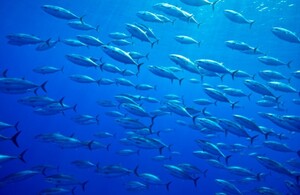Government opens more opportunities for sustainable Atlantic bluefin tuna fisheries outside the EU
More opportunities for sustainable Atlantic bluefin tuna fisheries outside the EU through commercial and recreational fishing

The government has opened up more opportunities for sustainable Atlantic bluefin tuna fisheries outside the EU through commercial and recreational fishing which will support the sustainable management of the species whilst also delivering social and economic benefits to coastal communities.
Today’s announcement is another step in the government’s work to deliver thriving, sustainable fisheries outside the EU. It will see economic benefits to industry and coastal communities, both through increased catching opportunities and income from tourism, and ensure that Atlantic bluefin tuna stocks are managed in a sustainable manner underpinned by the best available science.
39 tonnes will be used for a new trial commercial fishery which takes advantage of an increased quota share of 65 tonnes for 2023.
The new trial commercial fishery for Atlantic bluefin tuna, delivered by Defra and the Marine Management Organisation (MMO) on behalf of the UK Fisheries Authorities, is the first of its type in the UK for decades. Licence authorisations have been issued to 10 fishermen following an expression of interest process.
Vessels will be permitted only to use low-impact rod and reel fishing gears which use lures, no live bait or chumming will be permitted. The trial fishery will be open until November 2023 and will assist in the evaluation of the sustainability of a small-scale commercial fishery for this species and the social and economic benefits this new fishery could potentially provide to UK fishermen.
After great success in 2021 and 2022, opportunities for recreational anglers to encounter Atlantic bluefin tuna will once again open up in the Catch and Release Tagging programme (CHART), which will be available through 24 charter vessels from fishing ports across South-West and Southern England.
Delivered by the Centre for Environment, Fisheries and Aquaculture Science (Cefas), the tuna caught in CHART will be carefully tagged and released back into the ocean by the skippers and their crew. The programme will provide important scientific data to understand and manage Atlantic bluefin tuna whilst also benefiting coastal communities through high-value tourism.
Today’s announcement comes after the government announced a major package of measures to deliver a thriving, sustainable fishing industry and healthy marine environment outside the EU. This included seizing on our new found freedoms outside the EU to introduce a world class system of fisheries management underpinned by Fisheries Management Plans, as well as a consultation on the establishment of a licensed recreational bluefin catch and release tuna fishery.
Fisheries Minister Mark Spencer said:
We’re committed to the sustainable management of Atlantic bluefin tuna, and today’s announcement will help deliver this while providing economic and social benefits to communities around our coast.
I look forward to seeing the valuable research that this work will deliver, contributing hugely to developing a plan for how we use our quota in the future.
David Righton, CHART Principal Investigator said:
We are excited to continue our work with recreational fishers in CHART 2023, and to build on the results of CHART in 2021 and 2022.
The 2023 programme will further develop our understanding of the occurrence and demographics of Atlantic bluefin tuna in English waters and is a great demonstration of participatory science that provides valuable data for fisheries management.
In recent years, the number of reported sightings of Atlantic bluefin tuna in UK waters has been increasing. Reasons such as conservation measures and climate change impacts, including abundance of prey and changes to the marine environment are thought to have caused this increase in sightings.
The data collected from this work will contribute not only to improving understanding of Atlantic bluefin tuna in UK waters but will also be supplied to the International Commission for the Conservation of Atlantic Tunas (ICCAT).